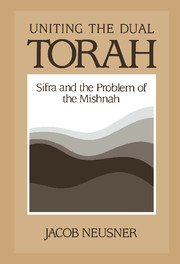Book contents
- Frontmatter
- Contents
- Preface
- Prologue
- 1 The Problem of the Mishnah
- 2 Torah as a Common Noun: The Solution of the Talmuds
- 3 A Sample of Sifra
- 4 From Common Noun to Proper Noun: Sifra's Re-presentation of the Two Torahs as One
- 5 Sifra's Alternative to the Mishnah's Topical Program and Its Order
- 6 Sifra's Alternative to the Mishnah's Logic of Cogent Discourse
- 7 Sifra's Alternative to the Mishnah's Proof of Propositions through Taxonomic Classification and Hierarchization
- 8 Re-presenting the Torah: Sifra's Rehabilitation of Taxonomic Logic
- 9 Torah as Proper Noun and the Structure of the Logic of Creation
- Appendix: The Distinctive Character of Sifra among Midrash Compilations
- Bibliography
- Index
- Frontmatter
- Contents
- Preface
- Prologue
- 1 The Problem of the Mishnah
- 2 Torah as a Common Noun: The Solution of the Talmuds
- 3 A Sample of Sifra
- 4 From Common Noun to Proper Noun: Sifra's Re-presentation of the Two Torahs as One
- 5 Sifra's Alternative to the Mishnah's Topical Program and Its Order
- 6 Sifra's Alternative to the Mishnah's Logic of Cogent Discourse
- 7 Sifra's Alternative to the Mishnah's Proof of Propositions through Taxonomic Classification and Hierarchization
- 8 Re-presenting the Torah: Sifra's Rehabilitation of Taxonomic Logic
- 9 Torah as Proper Noun and the Structure of the Logic of Creation
- Appendix: The Distinctive Character of Sifra among Midrash Compilations
- Bibliography
- Index
Summary
The theme of this book is how a remarkable authorship set forth a distinctive solution to a long-standing problem in the theology, literature, and law of the Judaism of the Dual Torah. The problem was posed by the character and standing of the Mishnah. From the moment of its promulgation as the basis for the law of Judaism, the Mishnah was represented as authoritative. Therefore, in the context of the life of Israel, the Mishnah enjoyed its standing as torah, divine revelation, which yet was clearly not like The Torah revealed by God to Moses at Sinai. To that problem there were two solutions: the successor documents that undertook the exegesis, amplification, and application of the Mishnah and that presented by the authorship of Sifra. The solution proposed by the successor authorities to the Mishnah, in Tosefta, ca. A.D. 300, the Talmud of the Land of Israel or Yerushalmi, ca. A.D. 400, and the Talmud of Babylonia or Bavli, ca. A.D. 600, was to treat the word or conception, torah, as a common noun, signifying, among other things, process, status, or classification. Then the Mishnah found ample place for itself within the capacious classification, torah.
The solution proposed by the authorship of Sifra was to treat the word, torah, as solely a proper noun, The Torah, but also to insist that the Mishnah found a fully legitimate position within The Torah.
- Type
- Chapter
- Information
- Uniting the Dual TorahSifra and the Problem of the Mishnah, pp. ix - xiiPublisher: Cambridge University PressPrint publication year: 1990



